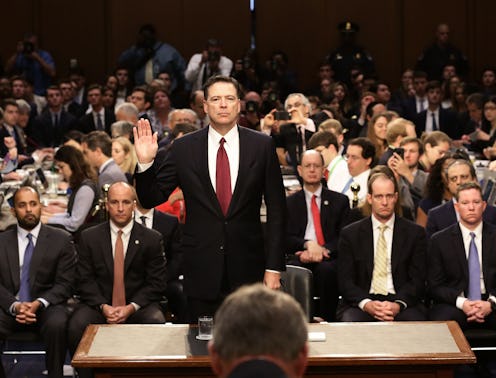News
Why This One Word In Comey's Testimony Could Make Trump Impeachable

On Thursday, when former FBI head James Comey appeared before the Senate Intelligence Committee, he wasn't just offering his testimony about his exchanges with Donald Trump. He also faced serious questioning — especially over whether the president allegedly ordered, or merely implied, Comey should end the investigation into former National Security Adviser Michael Flynn. In fact, at one of the tensest moments, all the focus was on one word allegedly used by Trump — "hope."
Sen. James Risch of Idaho zeroed in on the specific part of Comey's testimony, the alleged request from the president for Comey to drop the investigation into Flynn.
From Politico's transcript of the hearing, here is how the exchange went down:
RISCH: He did not direct you to let it go?
COMEY: Not in his words, no.
RISCH: He did not order you to let it go?
COMEY: Again, those words are not an order.
RISCH: He said, I hope.
Risch seemed interested in the differentiation between the president simply saying "I hope" in regards to Comey stopping the investigation and whether that was an explicit instruction. He asked Comey, "Do you know of any case where a person has been charged for obstruction of justice or, for that matter, any other criminal offense, where they said or thought they hoped for an outcome?" Comey said he took it as a direction.
Later in the testimony, Sen. Angus King of Maine asked Comey, "When a president of the United States in the Oval Office says something like, 'I hope' or 'I suggest' or 'would you,' do you take that as a directive?"
To which Comey replied: "Yes. It rings in my ear as, well, will no one rid me of this meddlesome priest," referencing a line by Henry II, who casually complained about the Archbishop of Canterbury in the year 1170, leading to the priests death shortly afterwards. (That's right, Comey's testimony wasn't just a civics lesson. You had to pull out your high school European History knowledge, as well.)
One of the major questions in trying to assess whether President Trump obstructed justice is whether he directed Comey to nix the Flynn probe. And determining whether there was obstruction of justice could be critical to whether there is a case for impeachment.
Thus, there is a lot of attention over Comey's claim that Trump said, "I hope you can see your way clear to letting this go, to letting Flynn go. He is a good guy. I hope you can let this go.” Even if Trump actually said those words, did he order Comey to drop the investigation, or was it just implied? According to a legal expert, that could make a big difference.
"I think it becomes harder to find obstruction of justice if the president is making a request rather than a command," says Saikrishna Prakash, a Professor at University of Virginia Law School. "That's part of the reason why people are focused on the president firing Comey. They think that he did something, that wasn't just jaw-boning Comey. In terms of the pressure that a president can bring to bear, it's possible that something that's termed as a request can sometimes be understood as a command," Prakash tells Bustle. "A request by the president is really understood by everybody in the room as a command."
But in Prakash's view, Comey's own testimony may have blunted the impact of this concern.
In the written testimony submitted Wednesday, Comey wrote of Trump's "hope" comment: "I had understood the President to be requesting that we drop any investigation of Flynn in connection with false statements about his conversations with the Russian ambassador in December." Prakash sees this language, and especially Comey's decision not to follow through on the president's request, as undermining the case that the president ordered him.
Comey's testimony provided some clarity on the interactions between the president and the former FBI director, but it leaves us with even more ambiguities about what will happen next in the investigation.